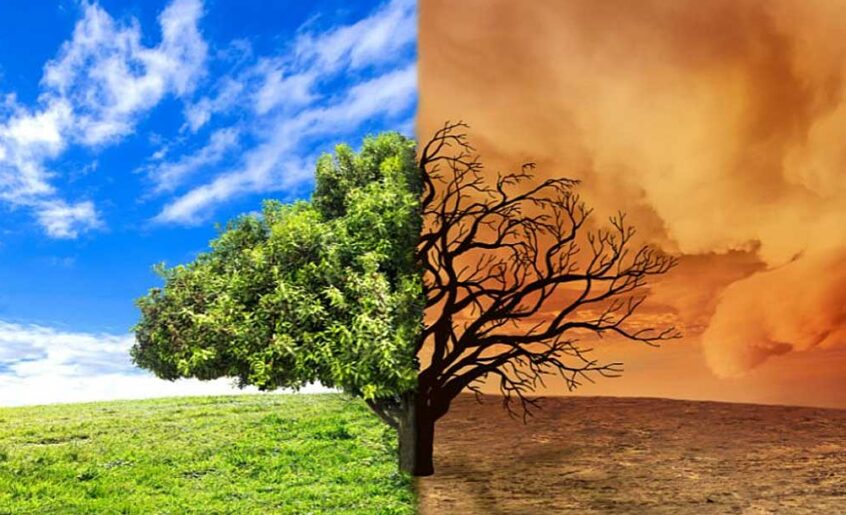A Brief Study Of Climate Changes

Volume 6, Issue 1, January-March 2023
A Brief Study Of Climate Changes
Shahnawaz Rampuri
PhD (Scholar), Arunodaya University – Arunachal Pradesh
Email id: shahnawazhs@yahoo.in
Abstract
Climate change is the long-term changes in the Earth’s climate due to human activities such as burning fossil fuels, deforestation, and agriculture, which release greenhouse gases into the atmosphere. The effects of climate change include more frequent and severe heatwaves, droughts, floods, storms, and rising sea levels. Countries around the world have signed on to the Paris Agreement, which aims to limit global warming to well below 2 degrees Celsius above pre-industrial levels. To achieve these goals, countries are working to reduce their greenhouse gas emissions through various measures such as transitioning to renewable energy sources and increasing energy efficiency. Collective action from governments, businesses, and individuals is required to address climate change.
KEYWORDS: Climate change, Global warming, Greenhouse gases, Paris Agreement, Renewable energy, Energy efficiency, adaptation, mitigation, Environmental Safety, Earth safety
1. INTRODUCTION
Climate change refers to the long-term changes in the Earth’s climate, particularly the increase in global temperatures, due to human activities such as burning fossil fuels, deforestation, and agriculture. These activities release greenhouse gases, particularly carbon dioxide, into the atmosphere, which trap heat and cause the planet to warm up.
The effects of climate change are already being felt around the world, including more frequent and severe heatwaves, droughts, floods, and storms. Rising sea levels are also threatening coastal communities and island nations.
There is a scientific consensus that human activities are the primary cause of climate change. To address this issue, countries around the world have signed on to the Paris Agreement, which aims to limit global warming to well below 2 degrees Celsius above pre-industrial levels, and to contribute efforts to limit it even further to 1.5 degrees Celsius.
To achieve these goals, countries are working to reduce their greenhouse gas emissions through measures such as transitioning to renewable energy sources, increasing energy efficiency, and implementing policies to reduce emissions from transportation and industry. Additionally, there is a growing focus on adaptation measures, such as building seawalls and improving water management, to help communities prepare for the impacts of climate change that are already underway.
It is clear that addressing climate change will require collective action from governments, businesses, and individuals around the world.

Fig. 1, Causes of Climate changes
2. EFFECTS OF CLIMATE CHANGES
The effects of climate change are numerous and far-reaching, affecting both natural systems and human societies. Few major consequences i.e effects of climate change are:
- Climate changes results severe weather events such as droughts, floods, heatwaves, Fire and storms.
- Rising sea levels due to the melting of glaciers and ice caps, which threaten coastal communities and island nations.
- Changes in precipitation patterns, leading to water scarcity in some regions and increased risk of flooding in others.
- Impacts on ecosystems, including changes in plant and animal populations, and alterations to habitats and food chains.
- Impacts on human health, including increased incidence of heat-related illnesses, respiratory diseases, and infectious diseases.
- Economic impacts, including damage to infrastructure and property, loss of agricultural productivity, and increased costs associated with adapting to climate change.
- Political and social impacts, including displacement of populations due to sea level rise and other climate-related events, and increased risk of conflict and instability in vulnerable regions.
- It is important to note that the effects of climate change are not uniform across regions or populations, and some groups, such as low-income communities and marginalized populations, are more vulnerable to the impacts of climate change than others.
- Ocean acidification: As the ocean absorbs more carbon dioxide from the atmosphere, it becomes more acidic, which can harm marine life such as coral reefs and shellfish.
- Loss of biodiversity: Climate change can cause species to go extinct or shift their ranges, disrupting ecosystems and reducing biodiversity.

Fig. 2, Effect of Climate changes
These effects of climate change are interconnected and can have cascading impacts on natural and human systems. Reducing greenhouse gas emissions and adapting to the impacts of climate change will require a coordinated global effort.
- Reduce greenhouse gas emissions: The most important step in addressing climate change is to reduce the amount of greenhouse gases that are released into the atmosphere. This can be done by transitioning to renewable energy sources, increasing energy efficiency, and reducing emissions from transportation and industry.
- Invest in climate adaptation: Even with significant efforts to reduce emissions, some degree of climate change is inevitable. Investing in climate adaptation measures, such as building seawalls and improving water management, can help communities prepare for the impacts of climate change that are already underway.
- Support research and development: Continued research and development into new technologies and approaches to address climate change will be critical to achieving global climate goals.
- Encourage international cooperation: Climate change is a global problem that requires a coordinated international effort. Encouraging international cooperation and collaboration can help ensure that efforts to address climate change are effective and equitable.
- Raise public awareness: Increasing public awareness of the causes and impacts of climate change can help build support for action and encourage individuals to take steps to reduce their own carbon footprints.
- Support policy solutions: Governments can play a critical role in addressing climate change by implementing policies that incentivize emissions reductions and support climate adaptation efforts.
- Reduce consumption and waste: Reducing consumption and waste can help to reduce greenhouse gas emissions, conserve natural resources, and promote sustainability.
- Support reforestation and afforestation: Planting trees and preserving forests can help to absorb carbon dioxide from the atmosphere and promote biodiversity.
- Support sustainable agriculture: Sustainable agriculture practices can help to reduce greenhouse gas emissions, improve soil health, and promote food security.
These suggestions, if implemented effectively and on a large scale, can help to mitigate the impacts of climate change and create a more sustainable future for all.
3. WHY IS CLIMATE CHANGE A PROBLEM?
Climate change is a problem because it poses significant threats to natural systems and human societies. The increase in global temperatures due to human activities such as burning fossil fuels, deforestation, and agriculture, causes changes in climate patterns and weather events that can lead to a range of negative impacts.
The effects of climate change include more frequent and severe weather events such as heatwaves, droughts, floods, and storms. Rising sea levels due to the melting of glaciers and ice caps threaten coastal communities and island nations. Changes in precipitation patterns lead to water scarcity in some regions and increased risk of flooding in others. Impacts on ecosystems, including changes in plant and animal populations, and alterations to habitats and food chains can lead to a loss of biodiversity. Impacts on human health, including increased incidence of heat-related illnesses, respiratory diseases, and infectious diseases, have been observed. Economic impacts, including damage to infrastructure and property, loss of agricultural productivity, and increased costs associated with adapting to climate change, have also been observed. Political and social impacts, including displacement of populations due to sea level rise and other climate-related events, and increased risk of conflict and instability in vulnerable regions are also possible.

Fig. 3, Framework on climate change and its impact on health (adapted from Watts et al., 2015 2)
Overall, climate change is a problem because it poses significant risks to human health, ecosystems, economies, and societies. It is important to take action to reduce greenhouse gas emissions and address the impacts of climate change to create a more sustainable and resilient future.
4. RECCONMENDATION
- Based on the current state of climate change, here are some recommendations for individuals, organizations, and governments:
- Individuals can take steps to reduce their carbon footprint by reducing energy consumption, choosing low-emissions transportation options, eating a plant-based diet, and supporting sustainable products and practices.
- Organizations can adopt sustainable practices such as reducing waste, investing in renewable energy, and implementing eco-friendly policies.
- Governments can implement policies that incentivize emissions reductions, invest in renewable energy, and support climate adaptation efforts. They can also work together to create international agreements and policies that address climate change on a global scale.
- Education and awareness campaigns can be developed to raise awareness about the importance of addressing climate change and to encourage action.
- Research and development can be supported to develop new technologies and approaches to address climate change.
- Financial resources can be directed towards climate change mitigation and adaptation efforts.
- International cooperation and collaboration can be promoted to address climate change on a global scale.
- It is important to note that addressing climate change will require a collective effort from all sectors of society. By working together and taking action, we can mitigate the impacts of climate change and create a more sustainable future for generations to come.
5. CONCLUSION
Climate change is a global problem that poses significant threats to natural systems and human societies. It is caused primarily by human activities such as burning fossil fuels, deforestation, and agriculture, which release greenhouse gases into the atmosphere. The effects of climate change are numerous and far-reaching, including more frequent and severe weather events, rising sea levels, changes in precipitation patterns, impacts on ecosystems and human health, economic impacts, and political and social impacts.
To address climate change, individuals, organizations, and governments must take action to reduce greenhouse gas emissions, invest in climate adaptation measures, support research and development, and promote international cooperation and collaboration. It is also important to raise public awareness about the importance of addressing climate change and to support policies and practices that promote sustainability and reduce consumption and waste. Climate change has positive & negative consequences. Negative consequences are very disastrous for us and future generation, So need to take effective measure to prevent negative consequence.
While addressing climate change will require a significant effort from all sectors of society, it is an essential step towards creating a more sustainable and resilient future for all.
REFERENCE
- IPCC. (2014). Climate change 2014: Synthesis report. Contribution of Working Groups I, II and III to the Fifth Assessment Report of the Intergovernmental Panel on Climate Change. IPCC.
- USGCRP. (2018). Fourth national climate assessment. U.S. Global Change Research Program.
- Climate Central. (n.d.). About Climate Central. Retrieved from https://www.climatecentral.org/about
- Climate Works Foundation. (n.d.). About. Retrieved from https://www.climateworks.org/about
- Nature. (n.d.). Nature climate change. Retrieved from https://www.nature.com/nclimate/
- Science. (n.d.). Science and climate change. Retrieved from https://www.sciencemag.org/category/climate-change
- Journal of Climate. (n.d.). Home. Retrieved from https://journals.ametsoc.org/jcli/index.jsp
- Sierra Club. (n.d.). Our mission. Retrieved from https://www.sierraclub.org/mission
- Greenpeace. (n.d.). About Greenpeace. Retrieved from https://www.greenpeace.org/usa/about/what-we-do/
